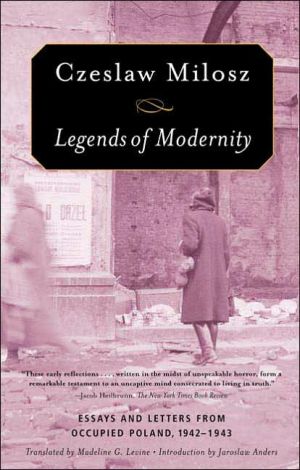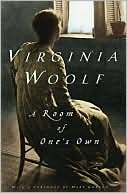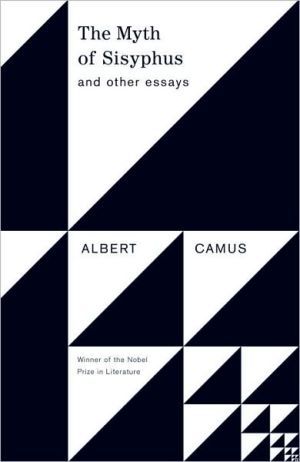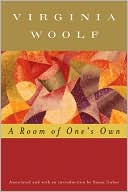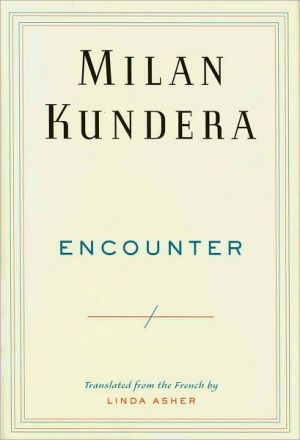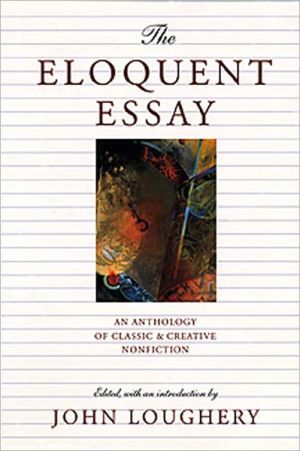Legends of Modernity: Essays and Letters from Occupied Poland, 1942-1943
Legends of Modernity, now available in English for the first time, brings together some of Czeslaw Milosz's early essays and letters, composed in German-occupied Warsaw during the winter of 1942-43.\ "Why did the European spirit succumb to such a devastating fiasco?" the young Milosz asks. Half a century later, when Legends of Modernity saw its first publication in Poland, Milosz said: "If everything inside you is agitation, hatred, and despair, write measured, perfectly calm sentences..."...
Search in google:
Legends of Modernity, now available in English for the first time, brings together some of Czeslaw Milosz's early essays and letters, composed in German-occupied Warsaw during the winter of 1942-43."Why did the European spirit succumb to such a devastating fiasco?" the young Milosz asks. Half a century later, when Legends of Modernity saw its first publication in Poland, Milosz said: "If everything inside you is agitation, hatred, and despair, write measured, perfectly calm sentences..." While the essays here reflect a "perfect calm," the accompanying contemporaneous exchange of letters between Milosz and Jerzy Andrzejewski express the raw emotions of "agitation, hatred and despair" experienced by these two close friends struggling to understand the proximate causes of this debacle of western civilization, and the relevance, if any, of the teachings of the Catholic church. Passionate, poignant, and compelling, Legends of Modernity is a deeply moving insight into the mind and emotions of one of the greatest writers of our time.Publishers WeeklyIn his landmark 1953 book, The Captive Mind, Nobel-winning poet and essayist Milosz discoursed on the havoc totalitarian rule plays on the mental processes of intellectuals. Here we see Milosz's own mind at work in Nazi-occupied Warsaw, crafting essays of ideas, pursuing a fantastically high-minded correspondence with friend and fellow writer Jerzy Andrzejewski, and developing themes inspired by the works of Defoe, Balzac, Gide, Stendhal and Nietzsche. Call it "The Captive Mind in Action." Curiously, the tension implied by Milosz's situation is hardly evident in the essays: where one might expect his tone to be skittish, fearful, foreboding, the most remarkable aspect is his ability to ensconce his steady authorial voice so l uxuriantly in the unpressing issues of, say, the imaginative projection required today to view Giotto's medieval saints properly. The most interesting essay demonstrating this phlegmatic tone enlists Tolstoy's War and Peace to help Milosz understand the global conflagration of his own time. But anger, bitterness and self-recrimination rage in some of the letters, where he says he thinks of writing a "confession... that would exceed in its violence and scream of pain, [the] Romantic era's settling of accounts of the conscience." For those who hanker for the high seriousness of continental thinkers like Camus, this volume is a welcome beacon from the past. (Oct. 12) Copyright 2005 Reed Business Information.
LEGENDS OF MODERNITY\ ESSAYS AND LETTERS FROM OCCUPIED POLAND, 1942-1943 \ \ By Czeslaw Milosz \ FARRAR STRAUS GIROUX\ Copyright © 1996 Czeslaw Milosz\ All right reserved.\ ISBN: 0-374-18499-2 \ \ \ Chapter One\ \ The Legend of the Island \ I knew an old woman who would slowly raise her hands to her temples in difficult moments and say; "Oh, if only I could be on an unpopulated island and have nothing to do with people, just escape, escape to somewhere far away." I always pictured her standing in front of a window outside of which the autumn trees are swaying and the lake is like a shimmering white spot. Her words did not echo against a background of city traffic; it was impossible to ascribe them to a distaste for the crowds filling the streets, factories, and cafés. All around was pure country, woods, a roadless expanse. The people from whom she wished to flee were her closest relatives, a cook, the sawmill's old watchman.\ Recalling this image, I think about all the men and women who, with a similar gesture and similar words, have expressed a longing for total isolation-about the generations that cultivated the legend of the island. An island without people! Given concrete form in Robinson Crusoe and thus conveyed from hand to hand as a Christmas present. As the first book about the world, it was one of those symbols acquired in childhood whose language was used by grown-ups to name their complicated experiences. An island without people is a legend, and like every legend, its contents are richer than the events that gave birth to it, that created the external skeleton for its development. Certain objects, thanks to their "underground" ties with features of human nature, acquire an almost magical power over man; they enter the vernacular lexicon as terms useful as names for hidden desires. To say "island" is to say at the same time "separation from the rest of the world by a barrier that is difficult to penetrate, yet one that is transparent, a brilliant blue, and does not offer a barrier to sight." "Island" signifies the safety of its inhabitants from the battles, quarrels, and wars of the rest of humanity. This absence of a threat, so fundamental to every legend of happiness, whether it be the biblical paradise or the "golden age" that has been transmitted outside of history, beginning with Ovid's Metamorphoses, is the essential feature of the island as it figures in the child's imagination (no teachers or parents can reach us there-a favorite daydream in class), just as it figures in the imagination of various epochs ("the fortunate islands," the island of Utopia).\ One may also assume that the island leads us into a different understanding of time than the time in which we normally live. Man conceives of time with the help of spatial images (time flows, a "segment" of time, a large "block" of time); he sees time as a fluid hovering above the earth. Cutting an island off from the mainland and surrounding it with the blue of the sea, he is inclined, by dint of many strange and beautiful errors, to sever its time from mainland time, to give it a different time, just as he gives it different laws and privileges from those on the mainland. The action of time on man, his aging, is a sensitive issue, where the youth of the people around him reminds him at every step of the number of years he has lived. Islanders of the legend are among people just like themselves; they form a single generation, and time loses its venom. A stay on Calypso, the island of nymphs, brings the gift of eternal life or the eternal peace of death. When processions of lovers frozen in a gesture of farewell (Watteau's Departure for Cythera) snake along the shore among tall feathery trees and debark from a green port, eternal happiness awaits them on the island of love. Prospero in Shakespeare's The Tempest is, in a sense, the lord of time-for the gift of summoning and quieting tempests, which is possessed by this hero of the most "islandic" work in the history of the theater, is, in the final analysis, the gift of changing and regulating time and its atmosphere. This is no doubt also the reason why Robinson, after so many years on his island, has not aged, but leaves the island full of energy and enthusiasm for further voyages.\ An absence of inhabitants adds one more feature to these general characteristics of the island: it has flora and fauna, but a human footprint in the sand is an unheard-of phenomenon, sufficient to send one into shock. On an uninhabited island, whoever visits and takes possession of it encounters the world with no assistance and no intermediary; he is alone, all ties with society sundered. His deeds no longer have any resonance among beings who resemble him; the causes and consequences of his behavior lie solely within him. In its condemnation of the hero to life in isolation, the legend of Robinson Crusoe is different from the island legends of the past. It contains both an attempt at submitting man's nature to close analysis, so that he can demonstrate who he really is when the garments of custom and convenience that adorn him fall away, and the weakly expressed conviction that in isolation, when he frees himself from the evil influences of the crowd, man is capable of extracting from within himself virtues that until then have been suppressed, buried under bad habits-in other words, the contrast between a single individual and collective life, a feeble outline of Rousseau's theory of man as naturally good. The old woman yearning for an uninhabited island appears to believe that the source of evil lies somewhere outside her, in her surroundings. And although she does not take her own words seriously, they help her to express that enveloping of oneself within oneself, that familiar escape into the depths of one's being, when we see how the mechanism of interpersonal relations creates evil without creating either perpetrators or victims: all are simultaneously perpetrators and victims.\ It should be clear from what has been stated here that, treated in this way, Robinson Crusoe expands to fit the dimensions of a phenomenon whose meaning significantly transcends both the English novelist's intentions and its own literary and artistic qualities. It is evidence, a spool on which the thread of one of our contemporary myths is wound. A Christian book, but already with a faint tinge of doubt about the goodness of this world, a grimace of bitterness whose consequences will be felt only in the nineteenth century. A Christian book: Robinson is cast away onto an island that is, for him, an island of penance and renewal. Saved by the hand of Providence from the ocean depths while his entire crew perishes, he regains consciousness on unfamiliar ground. His first gesture is to curse fate and to despair. Searching within himself, however, he discovers the cause of his present condition-his own sinfulness. The accident takes on the appearance of a just sentence and, at the same time, of kindly protection. It was by God's decree that he found himself on the island. God's protection sent him the tools he needed in the hull of the shattered vessel, not even forgetting a bit of grain, which he carelessly spilled, but, guided by the hand of God, spilled onto a place where it could grow and ripen. Deprived of the moral help of other men, having only the Bible as the sole rock upon which he can build, he elaborates on his own an entire system of good and evil and comes to understand his own guilt, a guilt defined precisely according to the principles of a Protestant-merchant morality; he had sinned by disobeying his parents and by craving profits he had not labored to earn. Translated into the language of ethical precepts, this means that man has an innate ability to distinguish between good and evil, and is religious by nature. All that need be done is to tear him away from collective errors and collective defects, and he will become pure, in the full brilliance of his immaculate majesty.\ For this change to occur, however, an extraordinary intervention is required, a violent shock such as the breaking up of the ship carrying Robinson and his comrades, a rupture with civilization. Does this not mean that civilization is contaminated? Does this not contain a discreet but sufficiently clear condemnation of civilization's gifts?\ This is where we come up against the flaw in the traditional Christian image of the world. The paths toward perfection of the individual that are indicated by Catholicism were strictly communal; the communal institution of the Church depended on collective prayer, on participation in the sacraments. The most pessimistic of Catholic philosophers, Saint Augustine, did not hesitate to recognize the Church as the sole effective instrument for the rebirth of the human individual and of all humankind. "In Catholicism, pessimistic elements are not tempered by the optimism of hope, but the optimism of faith in the Church is directly opposed to the pessimistic affirmation of evil, that is to say, of flawed human nature; the Church and the Church hierarchy are one; the Church, mediating between man and God, is the bestower of grace, the inerrant guide leading mankind out of the darkness of sin and damnation."\ Robinson, instead of turning feral and falling into a condition of dull-wittedness, is reborn morally in a virgin wilderness that had never before been disturbed by more than some cannibal's footsteps. From the Catholic point of view, he is nonhuman; he achieves heights accessible only to eremites adorned with the halos of saints. The story of Robinson Crusoe could not have arisen among cultures and peoples inclined to consider the individual as a part of the whole, regardless of whether those cultures are religiously, or secularly, communal.\ The task of digging an abyss between civilized society and the noble individual fell to writers of a Protestant spirit, who were, to a far greater degree than Catholic writers, obsessed with their moralizing mission and who sought within man himself the innate foundations of a good life, foundations that did not depend on any institutions. In this struggle, a race of indefatigable conquerors, colonizers, and sailors seemed to provide one more weapon in defense of these thinkers' belief that man, lost in the wilderness, in the company of wild animals and wild tribes, loses nothing of his moral worth-that on the contrary, only in those circumstances does he achieve it. Thanks to this belief, a farmer in a plaid shirt saying his evening prayers on the doorstep of a cabin he has built with his own hands in the woods beside the Mississippi or Missouri River could feel pure and noble as he made do without confessor or preacher. Beside him, gleaming in the setting sun, his rifle leans against a bench carved out of a tree trunk. He has used it to eliminate more than one Indian in self-defense or while participating in a raid against the original inhabitants of the land he has acquired by force.\ Tenacious, blind energy required an illusion that would justify and purify it. After all, Robinson Crusoe, creating ab novo a system of moral precepts, deriving them solely from his own soul, creates the very same conventional morality of the milieu from which he came, which is reason enough for us to doubt the existence of a seed of virtue, capable, like Japanese paper plants, of growing and producing flowers in a tightly corked bottle. Robinson Crusoe's pangs of conscience are the pangs of conscience of a merchant family's prodigal son. He is a Christian Buddenbrook, returning by some miraculous dispensation to the path of grim duty. He is one of the many characters, so popular in bourgeois novels, in which the child-monster, the child-freak who upsets his family, is a frequent if not constant motif. The sin of such a freak consists, above all, in his depleting the property accumulated through the labor of generations. The estate passes into the hands of the young people, and all that the parents worry about is the ability of their heirs to preserve and increase their inheritance, whether it be money, property, or a name held in regard by their neighbors. The prodigal son, different in his preferences and temperament from the other members of the clan, a cuckoo chick dreaming of forbidden flights, is a true misfortune for a stable, sober-minded family line.\ Exaggerated fear of this sort of catastrophe suggests to the burgher class the unequivocal rejection of all passions in life that are capable of turning the heir's attention away from a career prescribed by custom. The burgher class detects in every independent woman who is neither a wife nor a mother, nor a marriageable girl, a demon lying in wait for the chance to ensnare and ruin their sons. This class detects in art (in eighty out of a hundred cases the freak is an artist) the sign of immaturity, a sickness prolonged beyond the permissible bounds of childishness. Alcohol, cards, women, art, and an urge to keep changing his place of abode-that is a combination of madnesses that no self-respecting burgher drama can do without. Robinson Crusoe, above whom the voice of a puritanical God seems to thunder, "You did not obey your father and your mother, so you will obey your own dog's skin" (at least, that is what a puritanical God would have said had he been familiar with Polish proverbs), is the scourged prodigal son, deprived at last, in the most perfect way, of all temptations.\ "Eternal man" in the abstract, drained of the color that the social organism imposes on him, is astonishingly similar to a shopkeeper who works behind the counter in the gloomy outskirts of the city and hands over all his pitiful earnings to his mother. Robinson's model endurance, his years on end spent doing business errands, his gift for calculation (for example, seeking a place to erect his tent, he first enumerates four conditions that the place must meet and only then begins to survey the ground), his common sense, all conspire to make him into an ideal-but an ideal from a certain historical period and a certain tradition. The operation of revealing the true nature of man, undertaken in order to edify the reader, is not successful. Nonetheless, in this entrusting of the hero to the elements, a certain centrifugal aspiration of this civilization emerges, an urge to flee its environs, a search for new continents whose conquering will allow men to expand horizontally, to simplify, and to make younger-for how long?-whatever it is in this civilization that inhibits his ability to grow higher and to put down roots.\ That is how the weariness of the gaze directed at the social creation appears, in which one can discern only the dark sides. Defoe, hounded by believers, selling himself to political parties, betraying for mere pennies the press secrets of his colleagues, had to flee to an unpopulated island in his desire to rescue his model Christian. Thus arose the first portrait in the long gallery of noble savages, the unspoiled children of nature. Eighteenth-century literature would find the heroine of a novel in Virginie, a maiden from the wilderness who could barely read and write. She commands the simple folk of the Huron Indians tribe to marvel naively at the crimes of the Christian-monarchist system. What an eloquent sight Napoleon is: the ruler of a continent, a tyrant who made use of every injustice on his road to power, who reveled in reading the sentimental, maudlin adventures of Paul and Virginie, those lovers "unspoiled" by civilization, in a novel written by that unfeeling, greedy, conniving Bernardin de Saint-Pierre, a master of intrigue in literary circles, who, just like his imperial reader, knew very well the secrets of the hunt in the human jungle. That is what is known as blindfolding oneself with a scarf painted with exotic flowers, yearning for deception at any price so that, though those who surround us and we ourselves are really like criminals, somewhere far away, beyond the reach of scepter and gold, there are just people, capable of enthusiasm and of tears.\ (Continues...)\ \ \ \ \ Excerpted from LEGENDS OF MODERNITY by Czeslaw Milosz Copyright © 1996 by Czeslaw Milosz. Excerpted by permission.\ All rights reserved. No part of this excerpt may be reproduced or reprinted without permission in writing from the publisher.\ Excerpts are provided by Dial-A-Book Inc. solely for the personal use of visitors to this web site. \ \
IntroductionviiEssays from the OccupationPreface3The Legend of the Island6The Legend of the Monster City18The Legend of the Will33Absolute Freedom49Beyond Truth and Falsehood64The Experience of War75Zdziechowski's Religiosity88The Boundaries of Art (Stanislaw Ignacy Witkiewicz from the Perspective of Wartime Changes)109Letter Essays of Jerzy Andrzejewski and Czeslaw MiloszICzeslaw Milosz to Jerzy Andrzejewski149IIJerzy Andrzejewski to Czeslaw Milosz160IIICzeslaw Milosz to Jerzy Andrzejewski173IVJerzy Andrzejewski to Czeslaw Milosz187VCzeslaw Milosz to Jerzy Andrzejewski202VIJerzy Andrzejewski to Czeslaw Milosz213VIICzeslaw Milosz to Jerzy Andrzejewski226VIIIJerzy Andrzejewski to Czeslaw Milosz239IXCzeslaw Milosz to Jerzy Andrzejewski245Notes to the 1996 Polish Edition259Notes to the Essays263
\ Publishers WeeklyIn his landmark 1953 book, The Captive Mind, Nobel-winning poet and essayist Milosz discoursed on the havoc totalitarian rule plays on the mental processes of intellectuals. Here we see Milosz's own mind at work in Nazi-occupied Warsaw, crafting essays of ideas, pursuing a fantastically high-minded correspondence with friend and fellow writer Jerzy Andrzejewski, and developing themes inspired by the works of Defoe, Balzac, Gide, Stendhal and Nietzsche. Call it "The Captive Mind in Action." Curiously, the tension implied by Milosz's situation is hardly evident in the essays: where one might expect his tone to be skittish, fearful, foreboding, the most remarkable aspect is his ability to ensconce his steady authorial voice so l uxuriantly in the unpressing issues of, say, the imaginative projection required today to view Giotto's medieval saints properly. The most interesting essay demonstrating this phlegmatic tone enlists Tolstoy's War and Peace to help Milosz understand the global conflagration of his own time. But anger, bitterness and self-recrimination rage in some of the letters, where he says he thinks of writing a "confession... that would exceed in its violence and scream of pain, [the] Romantic era's settling of accounts of the conscience." For those who hanker for the high seriousness of continental thinkers like Camus, this volume is a welcome beacon from the past. (Oct. 12) Copyright 2005 Reed Business Information.\ \ \ \ \ Library JournalModernity as a concept includes several movements that scrutinized historical events and scientific research to redefine religious practices and teachings and find new ideas and expression-in other words, not a simple concept to write about or read. These essays and letters by Nobel laureate Milosz (To Begin Where I Am) were composed in German-occupied Poland during l942 and l943. Written to the young intellectual Jerzy Andrejewski, the letters reveal Milosz's concern about the political climate of the era and the deterioration of religious influence owing to the chaos all across Europe and the rest of the world. Layered and dense, the essays explore the ideas of William James, Andr Gide, Stendhal (Henri Beyle), Honor de Balzac, and others as they relate to religious faith, reason and rationalism, contradictions, doubting, and believing in a civilized world and its religious institutions. Here Milosz was speaking of the Catholic Church primarily, believing that it was still stalwart and that it played a key role as a protector at every level of human endeavor. Most of the pieces deal with the sway of the historical process over the universe of ideas, all couched in a metaphysical vision of observation and emotion. Reading Milosz is a demanding, rewarding, and ultimately powerful experience for the mind and the soul. Recommended for all libraries. [See Prepub Alert, LJ 5/15/05.]-Robert Kelly, Fort Wayne Communities Schs., IN Copyright 2005 Reed Business Information.\ \ \ Kirkus ReviewsEssays that anticipate themes that Polish-born Milosz would develop in The Captive Mind. "When someone begins to admire totalitarianism, I look at him as if he's a madman." Thus the future holder of the Nobel Prize in Literature, at about the age of 30. Thoroughly schooled as a Catholic intellectual, Milosz had formulated an anti-modernist view of the world that opposed the individual to the state and presupposed that the individual would forever be adrift outside of the nurturing community of the church. The first essay in this collection, written in 1942, centers on Daniel Defoe's Robinson Crusoe and a lawless world in which the hawk tears apart the bird ("that's me," he writes) and armies of ants clash. Crusoe's island is less perilous to body and soul than modern times, though, and Milosz, sounding here like Solzhenitsyn and there like John Paul II, weighs in on the soullessness that permits a virus like Nazism or Stalinism to flourish. Blame it on the likes of Friedrich Nietzsche. And of the then-influential French writer Andre Gide, whose "depravity does not reside in his homosexuality . . . [but] on having draped a cloak of beauty around the most poisonous and destructive intellectual currents, which prepared a worldwide cataclysm." And not just Gide, the former apologist for the Soviet regime, but also Marinetti, the Italian Futurist who "offended the public with his roars in honor of energy and brutality and called for the destruction of museums," and all the other European nihilists who paved the way for the dictators. Denouncing the exuberant anti-intellectualism of the day, Milosz layers in learned references to Catholic thinkers who are little known except to students oftheology today, quotes from authors and philosophers, and urges that the life of the mind is to be prized over the active life, even though the latter "is far more attractive to the masses."Of interest to Milosz completists-and antimodernists.\ \
